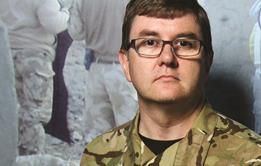Field and tent hospitals succeed where the NHS doesn’t due to their integration with other teams and units, says John Deverill
I am a military veteran and proud of it: my 17 years’ service ended roughly as the 10-year period Colonel Hodgetts describes began. Reading this interview amplifies the pride that I share with other veterans: pride in excellence, dedication, service and concern for people. I am proud of my current profession too: I see many of the same qualities in NHS and social care colleagues as endure in the ex-servicemen and women I’ve served with: achievement, hard-won results and fantastic drive.
‘There were waves of improvement and innovation after Korea and Vietnam and now, as operations in Iraq and Afghanistan draw down, there is evidence of the same’
We can learn a lot from combat about the delivery of healthcare – both at the sharp end of trauma and in rehab. Historically, there were waves of improvement and innovation after Korea and Vietnam and now, as operations in Iraq and Afghanistan draw down, there is evidence of the same. Some of this stems from the kit. Some of it is down to new clinical practice, which isn’t always applicable at home: most civilian trauma is blunt rather than penetrating, and many civilian patients are older, with below-average fitness.
Integration, not scale
But the overriding lessons here lie in military approaches to the delivery of care. This is more about integration than scale: modern field hospitals work well because of their systematic integration with retrieval and transfer teams, regional trauma centres and rehabilitation units.
The improvements Colonel Hodgetts describe stem from a culture that encourages innovation but only if it is supported by evidence, fanatical attention to data collection and robust evaluation. This creates continuous improvement.
Poor-quality service data is too often cited in the NHS as a reason for not doing things differently. We need a culture where doctors are themselves responsible for the quality of data captured at patient bedsides, so that our information is properly owned. And we need to learn from the weekly system-wide conference calls with clinicians and policy-makers, focused on solving problems for individual patients: if we build evolving multidisciplinary group models firmly around such calls, the impact on improving flow and removing delay could be huge.
‘The NHS needs the same leadership culture that built enough momentum to allow services in fields and tents to deliver better outcomes than the NHS’
And, most impressively, the NHS needs the same leadership culture that built enough momentum and energy to allow services in fields and tents to deliver better outcomes than the NHS. We can deliver innovation based on sound information; we can transform with energy and focus.
Let’s adopt the “I don’t give a stuff which organisation you’re from, let’s sort it out for the patient” approach. Deliver from soup to nuts, without forgetting the benefits of a combat codpiece.
Former soldier John Deverill is managing director of Finnamore. He was awarded the MBE and Queen’s Commendation for Valuable Service. While in the army, John experienced many periods of active operations. Serving alongside Defence Medical Services, he witnessed the level of excellence they provide
Topics
Fight for change: healthcare lessons from the battlefield

Focus on evidence based data
- 1
 Currently
reading
Currently
reading
What combat teaches us about delivery of care
- 3































No comments yet